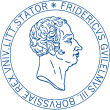Hans Herter
Hans Lukas Herter (born June 8, 1899 in Koblenz ; † November 7, 1984 in Bonn ) was a German classical philologist who was professor at the University of Bonn from 1938 to 1967 .
Life
Herter was baptized Protestant and graduated from the Kaiserin-Augusta-Gymnasium in Koblenz. After studying at the University of Bonn (from 1917, interrupted by French captivity until 1920), he received his doctorate there in 1924 and then became an assistant. He completed his habilitation in 1927 and went to the University of Tübingen in 1932 , initially as an associate professor and since 1933 as a full professor.
After the recall of Bonn professor Christian Jensen to Berlin (1937), the appointment committee of the University of Bonn drew up the following appointment list: Johannes Mewaldt , longstanding professor in Vienna; Hans Herter in second place; Franz Dirlmeier , Munich chair representative, in third place. After Mehwaldt had refused the offer and Dirlmeier had finally received the Munich ordinariate, Hans Herter was appointed as the preferred candidate of Professor Ernst Bickel on November 1, 1938. Hans Herter had an excellent reputation as a scientist and academic teacher and was outwardly politically adjusted. He had been a member of the SA and the National Socialist Teachers' Association since 1933, and in 1937 he also became a member of the NSDAP and the NSDDB .
During the Second World War acted Herter several semesters as Dean of the Philosophical Faculty (winter semester 1940/1941 until winter semester 1942/1943) and as vice-rector of the university (summer semester 1942 and winter semester 1944/1945). He was one of the confidants of the Rector Karl F. Chudoba .
After the end of National Socialism , Herter was questioned by the university's examination board. As dean and vice-rector, he had supported the university policy of the rector Chudoba. However, he did not emerge politically and there is no National Socialist ideas in his writings. His membership in various Nazi organizations was justified by both Herter and his friends with concerns about his professional advancement. In particular, the philology professor Bickel and the ancient historian Friedrich Oertel testified in Herter's favor. Therefore, Herter was confirmed in his office and taught in Bonn until his retirement in 1967, at the age of 67.
For many years, Herter was editor of the Rheinisches Museum für Philologie . He was particularly interested in the Greek authors Thucydides and Plato as well as Hellenistic poetry. Since 1958 Herter was a member of the Austrian Academy of Sciences . On December 16, 1962, the University of Athens awarded him an honorary doctorate.
literature
- Hans-Paul Höpfner: The University of Bonn in the Third Reich: Academic biographies under National Socialist rule . Bonn 1999.
- Heinz Gerd Ingenkamp , Rainer Lengeler, Ernst Vogt (eds.): In memoriam Hans Herter. Speeches held on May 3, 1985 at the commemoration of the Philosophical Faculty of the Rheinische Friedrich-Wilhelms-Universität Bonn . Bonn 1986, ISBN 3-416-09158-2 .
- Carl Werner Müller : Obituary for Hans Herter . In: Rheinisches Museum für Philologie 128, 1985, pp. 3–4.
- Karl August Neuhausen : Lex quaedam Bonnensis, quam quidem Iohannes Herter Latinissimus Latinae scriptionis arbiter promulgasse tradatur ore praeconio, mandanda memoriae . In: Eikasmós 4, 1993, pp. 195-198.
- Ernst Vogt : Bibliography Hans Herter. For his 65th birthday on June 8, 1964 . Bonn 1964.
- Clemens Zintzen : Ernst Bickel on Hans Herter . In: Eikasmós 4, 1993, pp. 129-130.
Web links
- Literature by and about Hans Herter in the catalog of the German National Library
- Atlantis Scout: Hans Herter about Plato's Atlantis for download.
Individual evidence
| personal data | |
|---|---|
| SURNAME | Herter, Hans |
| ALTERNATIVE NAMES | Herter, Hans Lukas (full name) |
| BRIEF DESCRIPTION | German classical philologist |
| DATE OF BIRTH | June 8, 1899 |
| PLACE OF BIRTH | Koblenz |
| DATE OF DEATH | November 7, 1984 |
| Place of death | Bonn |
